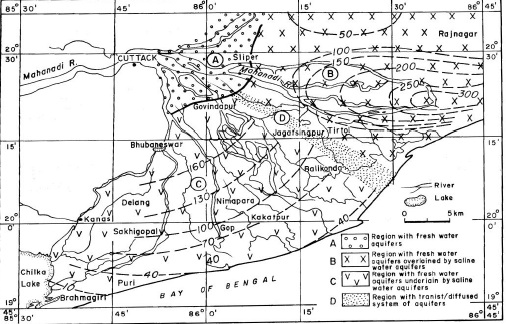Bay of Bengal
Prof G.D. Agrawal resumes fast unto death to save the Ganga, Swami Avimukteshwaranand and others to join in support
Posted on 21 Jul, 2010 11:10 AMForwarded to the Portal by: Ayan Biswas
Image and News Courtesy:
Shankracharya designate Swami Avimukteshwaranand ji presided over an emergency meeting organized by Manushi Sangathan, Ganga Ahvaan and Ganga Yamuna Jal Biradri to express our strong protest against the patently illegal decision of the Group of Ministers giving clearance to the Loharinag-Pala dam on the Ganga River. The following expert members of the NGRBA also participated in the meeting to express their strong protest having been kept in the dark about the appointment of the GoM which has passed a virtual death sentence on the most sacred river of India: Rashid Hyatt Siddiqui, Rajendra Singh, Rama Raota and Ravi Chopra.
Artificial recharging of an unconfined aquifer with an injection well in Ghataprabha sub-basin– A research report by National Institute of Hydrology
Posted on 21 Jul, 2010 08:47 AMThe report deals with the artificial recharging of an unconfined aquifer with injection well in the Hukkeri taluka in Ghataprabha sub-basin of Krishna river. The Ghataprabha sub-basin of Krishna like most river basins of peninsular India has been facing groundwater development problems varying in nature and severity. It has got a wide spectrum of issues such as cases of failure of wells at several places on the one hand, while some areas becoming unfertile due to waterlogging.
Rainfall-runoff modeling using Artificial Neural Network technique for Baitarni river in Orissa – A Research Report by National Institute of Hydrology
Posted on 20 Jul, 2010 07:21 PMThe research study attempts to develop a rainfall-runoff model using the Artificial Neural Network (ANN) technique for the Baitarni river in Orissa. A detailed review of the research work in the area of interest revealed that the approach of neural computations was very effective in developing the required model, due to its various advantages. Accordingly, three candidate models based on ANN architecture were developed for the study area, to represent rainfall-runoff transformation.
Raingauge network design for Pagladiya basin - A Research Report by National Institute of Hydrology
Posted on 20 Jul, 2010 08:02 AMIn the study, raingauge network design has been developed for the Pagladiya basin of Brahmaputra river in Nalbari, Assam and Bhutan. Precipitation is the most basic data required for any water resources study and the estimation of the number & location of raingauge stations that provide adequate information regarding rainfall falling over the catchment is referred to as network design. A raingauge network is intended to serve general as well as specific purposes such as water supply, hydropower generation, flood forecasting, irrigation and flood control.
Development of conjunctive use model for lower Gandak basin – A Research Report by National Institute of Hydrology
Posted on 19 Jul, 2010 11:02 PMThe study attempts to develop a conjunctive use model involving judicious use of surface and groundwater for the Habibpur region of Gandak command in Bihar. The area is characterized by insufficient surface water during rabi and summer seasons and excess surface water in the kharif season.
A modified SCS-CN based hydrologic model – A research report by National Institute of Hydrology
Posted on 12 Jul, 2010 09:37 PMThe Soil Conservation Services Curve Number (SCS-CN) method presented in this report has been applied to two large catchments in sub-humid regions of India and its performance evaluated. The variation of the curve number is examined and discussed and a critical evaluation of the employment of the single linear reservoir routing technique and linear regression technique presented.
Development of regional flood formula using L moments for north Brahmaputra river system – A research report by National Institute of Hydrology
Posted on 12 Jul, 2010 05:16 PMIn this study, an attempt has been made to develop a regional flood formula using L-moments for the north Brahmaputra river system. The annual maximum peak flood data of twelve gauging sites of the north bank tributaries of the river have been considered. The screening of the data has been carried out for assessing the suitability of the data for regional flood frequency analysis by computing the Discordancy Measure (Di) in terms of L-moments. Also, homogeneity of the region has been tested using the L-moment based heterogeneity measure, H.
A study of saline freshwater interface phenomena in the Mahanadi delta region (Orissa)
Posted on 10 Jul, 2010 10:40 PM The subsurface aquifer systems in Mahanadi delta region in Orissa (India) is largely characterized by two groups of freshwater aquifer systems, both of which are prone to saline water mixing/migration with time and development:
The subsurface aquifer systems in Mahanadi delta region in Orissa (India) is largely characterized by two groups of freshwater aquifer systems, both of which are prone to saline water mixing/migration with time and development:
- The south western Mahanadi delta region is represented by unconfined to semi-confined freshwater aquifers underlained by brackish/saline aquifer systems with a diffusion boundary.
- The north eastern parts of Mahanadi delta is represented by deep freshwater confined aquifers overlained by brackish/saline water aquifers with aquitard/ aquiclude boundary.
Optimal operation of groundwater skimming wells A study of 90 wells along the river Yamuna at Palla,North Delhi
Posted on 02 Jul, 2010 04:49 PMAbstract
A study of saline freshwater interface phenomenon in the Mahanadi delta region, Orissa
Posted on 02 Jul, 2010 04:47 PMABSTRACT